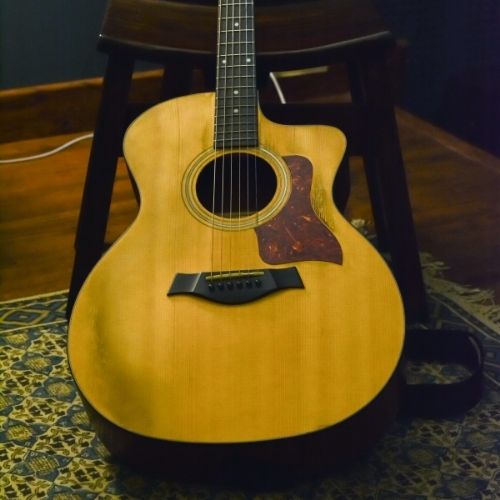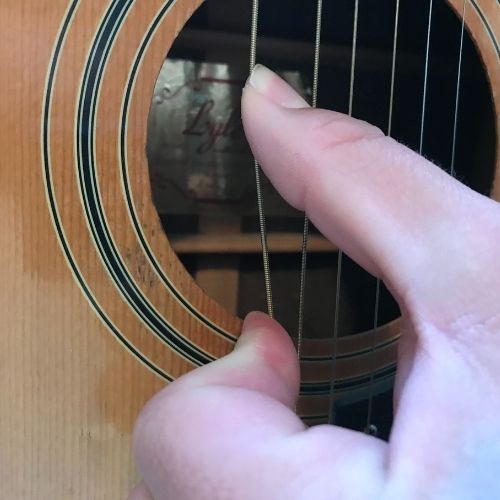We may get commissions for purchases made through links in this post. Thanks for the support! 👍
The strings on your guitar may seem like an afterthought to a lot of people, but don’t underestimate their importance in the sound you get from your instrument. Many factors can contribute to whether or not you sound good when you play, and the strings on your guitar are one of them. Does it matter what guitar strings you use?
Guitar strings really do matter, as they can affect the quality and sound of your guitar dramatically. Different types and brands of strings have variations that can change the sound. This includes different coatings, cores, gauge sizes and more.
That depends on what kind of music you’re playing and how often you play it. Read on to learn more about choosing guitar strings based on your instrument and needs as a player.

The Gauge of Your Strings Can Affect Your Sound
The main difference between gauges is in tension. Heavier gauge strings like these have more tension, meaning they are harder to play, but they also produce a thicker sound.
If you plan on playing mostly rhythm and don’t care about how hard chords are to play, then heavy-gauge strings can give your tone a fuller sound. If you want your finger-picking to cut through in an ensemble setting, lighter gauge strings might be better for you.
When deciding on your next set of guitar strings, there are a few things to keep in mind. The type of music you plan on playing will determine how thick or thin your string gauges should be.
For example, if you’re playing folk music, then a lighter gauge is best (thinner). On the other hand, if you’re playing in a heavy metal band, heavier gauge strings will give more volume and fuller sound when they are played.
The tenser that your string is upon release from its grooves, generally speaking, heavier gauges have more tension than lighter ones do. So, choose your string based on what kind of music you play!
You should also think about whether or not you prefer round wound or flat wound types of string. Round wound strings have a smoother surface, which can be nice for fingerstyle playing, whereas flat wound strings tend to offer a rougher surface which can give more sustain to your sound.
If you can find some half-round strings they can create a happy medium between round and flat wound strings, although they can be rare and a little more expensive.
What are gauge sizes, anyway?
Gauge refers to a string’s thickness, with lower numbers indicating a thicker string. Higher numbers refer to thinner strings. For example, most acoustic guitars (especially beginner guitars) are strung with light-gauge strings around .014 to .052.
Electric guitars commonly use medium-gauge sets ranging from about .010 to .014. Gauges are sometimes used to describe how stiff or flexible a particular set of strings is: Thicker gauges tend to be stiffer while thinner gauges tend to be more flexible and easier on your fingers if you have arthritis or other health issues that affect your hands or wrist when playing an instrument.
The Different Kinds of Strings
When trying to choose a set of strings, there are three main types you’ll need to consider: coated, uncoated and synthetic.
Coated strings like these are typically made from steel or nickel wound around a nylon core. The coating is applied for many reasons—to make them easier to apply (and hold) onto your guitar’s tuning pegs; to make their sound more consistent when strummed or plucked.
But some players don’t like coated strings as much due to their bright tone. If you like your music on the mellow side, you might want to stick with uncoated or synthetic strings instead.
The main difference between uncoated and synthetic is that uncoated strings are usually made of pure metal while synthetic ones have plastic cores (with metal winding). Uncoated strings tend to be cheaper than synthetic ones but also wear out faster and can sometimes snap during intense performances—like live shows.
Synthetic strings, on the other hand, tend to stay in tune better than uncoated ones but can sometimes feel mushy compared with uncoated options.

Guitar String Cores
A string’s sound and playability largely depend on its core. For example, unwound strings have round cores, while wound strings use flat or hexagonal cores.
Round-core strings produce a warm tone with more sustain, while flat-core strings are brighter and crisper. Hexagonal-core strings are somewhere in between—they’re not as bright as round-core strings but they don’t have as much sustain as their unwound counterparts.
The type of material used to make a string’s core can also affect its tone—you may hear steel referred to as bright steel or heavy steel, for instance. Each variety has different tonal properties that result in different sounds when played through an amplifier.
- Top 5 Reasons Acoustic Guitars are Great for Beginners
- Should you buy a used guitar? [Pros & Cons + Where to buy]
- You Can Teach Yourself Guitar: Here is why!
Why do guitars have two “E” strings?
Guitars are equipped with two different “E” strings to create a richer, more full sound. The thicker “E” string is tuned to a lower pitch, while the thinner “E” string is tuned to a higher pitch. When both strings are played together, they create a more complex sound that is fuller and more resonant than either string would produce on its own.
This unique guitar sound is one of the reasons that the instrument is so popular among musicians of all genres. So next time you pick up a guitar, be sure to give thanks to those two little “E” strings for helping to create such beautiful music.
Does guitar string brand matter?
In short, yes and no. More expensive strings tend to be made of higher quality materials, which can make them last longer and sound better.
On the other hand, cheaper strings may not sound as good but they’re more affordable, so you can experiment with different brands until you find the perfect fit for your guitar and playing style. Ultimately, it’s up to the individual player to decide whether brand matters when it comes to guitar strings.
I have found that sticking to a specific brand that you like is a great practice, as they will generally build their complete lineup to be very similar to eachother, just with variations.
I personally am a huge fan of Martin Guitar Strings like these ones, as they give a nice bright sound and work very well.
Conclusion
Yes, it does matter what guitar strings you use. Although most of us are drawn to a certain type of string (metal strings give an altogether different sound than nylon strings for example), it’s best to know why certain brands or types work better for specific styles of music.


